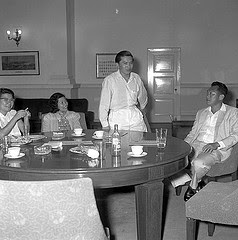Former detainee dies of cancer, aged 72
Leong Weng Kam, Senior Writer, Straits Times, 16 June 2011
 Former political detainee and lawyer Tan Jing Quee (above) died on Tuesday after a five-year battle with cancer.
Former political detainee and lawyer Tan Jing Quee (above) died on Tuesday after a five-year battle with cancer.
FORMER political detainee and lawyer Tan Jing Quee (above), arrested in 1963 under the Internal Security Act (ISA) for alleged pro-communist activities, died on Tuesday after a five-year battle with cancer.
Mr Tan, who contested the 1963 election as a Barisan Sosialis candidate and lost to the late S. Rajaratnam in Kampong Glam by 220 votes, was 72.
Released from detention in 1966, he left to study law in London. Returning in 1970, he set up the firm Jing Quee & Chin Joo with a fellow detainee, leftist unionist Lim Chin Joo, in 1973.
He was arrested again and detained for about three months in February 1977 under the ISA for allegedly joining a group to revive pro-communist activities here.
But Mr Tan, who researched, wrote and edited books on Singapore’s leftists in recent years, always maintained he was not involved in Communist United Front activities.
He was most recently a contributor and editor of The May 13 Generation, a book of essays on the Chinese middle school student movement in the 1950s. It was launched here last month.
His wife of 40 years, Mrs Rosemary Tan, 65, said yesterday that her husband, who had prostate cancer and was recovering from an operation to remove a tumour in his spine, was in Kuala Lumpur and Penang last month to promote the book with its two other editors, Dr Tan Kok Chiang and Dr Hong Lysa.
He was not well after returning and was admitted to Singapore General Hospital on May 31, dying a fortnight later.
Mr Tan was a leader of the University Socialist Club in the early 1960s, while a student at the University of Malaya in Singapore. He later worked as secretary of the now-defunct Singapore Business Houses Employees Union.
Mr Tan and Mr Lim – younger brother of the late PAP founding leader Lim Chin Siong, who broke away to form the Barisan Sosialis in 1961 – retired from their law firm about 10 years ago.
Mr Lim, 73, described his friend of nearly 40 years as a man ‘dedicated to the cause of improving the lot of Singaporeans, not someone who would create civil disorder and destabilise the country’.
Mrs Tan also said allegations of his involvement in Communist United Front activities were untrue: ‘He was a brave man who fought for the rights of the people and who loved his family and friends.’
The couple have three grown children. His wake is being held at his home at 3, Coronation Walk until tomorrow. His body will be cremated at Mandai Crematorium on Saturday at 1.30pm. – ST
Leong Weng Kam, Senior Writer, Straits Times, 16 June 2011

FORMER political detainee and lawyer Tan Jing Quee (above), arrested in 1963 under the Internal Security Act (ISA) for alleged pro-communist activities, died on Tuesday after a five-year battle with cancer.
Mr Tan, who contested the 1963 election as a Barisan Sosialis candidate and lost to the late S. Rajaratnam in Kampong Glam by 220 votes, was 72.
Released from detention in 1966, he left to study law in London. Returning in 1970, he set up the firm Jing Quee & Chin Joo with a fellow detainee, leftist unionist Lim Chin Joo, in 1973.
He was arrested again and detained for about three months in February 1977 under the ISA for allegedly joining a group to revive pro-communist activities here.
But Mr Tan, who researched, wrote and edited books on Singapore’s leftists in recent years, always maintained he was not involved in Communist United Front activities.
He was most recently a contributor and editor of The May 13 Generation, a book of essays on the Chinese middle school student movement in the 1950s. It was launched here last month.
His wife of 40 years, Mrs Rosemary Tan, 65, said yesterday that her husband, who had prostate cancer and was recovering from an operation to remove a tumour in his spine, was in Kuala Lumpur and Penang last month to promote the book with its two other editors, Dr Tan Kok Chiang and Dr Hong Lysa.
He was not well after returning and was admitted to Singapore General Hospital on May 31, dying a fortnight later.
Mr Tan was a leader of the University Socialist Club in the early 1960s, while a student at the University of Malaya in Singapore. He later worked as secretary of the now-defunct Singapore Business Houses Employees Union.
Mr Tan and Mr Lim – younger brother of the late PAP founding leader Lim Chin Siong, who broke away to form the Barisan Sosialis in 1961 – retired from their law firm about 10 years ago.
Mr Lim, 73, described his friend of nearly 40 years as a man ‘dedicated to the cause of improving the lot of Singaporeans, not someone who would create civil disorder and destabilise the country’.
Mrs Tan also said allegations of his involvement in Communist United Front activities were untrue: ‘He was a brave man who fought for the rights of the people and who loved his family and friends.’
The couple have three grown children. His wake is being held at his home at 3, Coronation Walk until tomorrow. His body will be cremated at Mandai Crematorium on Saturday at 1.30pm. – ST





